Unit 5 Section Ⅳ Assessing Your Progress & Video Time 2024-2025学年高中英语版必修第一册人教版 课件
文档属性
| 名称 | Unit 5 Section Ⅳ Assessing Your Progress & Video Time 2024-2025学年高中英语版必修第一册人教版 课件 |  | |
| 格式 | pptx | ||
| 文件大小 | 1.6MB | ||
| 资源类型 | 试卷 | ||
| 版本资源 | 人教版(2019) | ||
| 科目 | 英语 | ||
| 更新时间 | 2024-10-20 17:46:54 | ||
图片预览

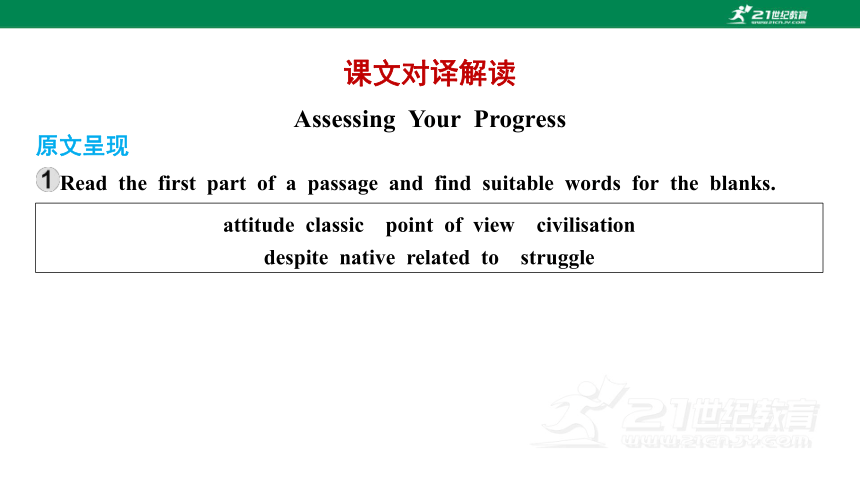
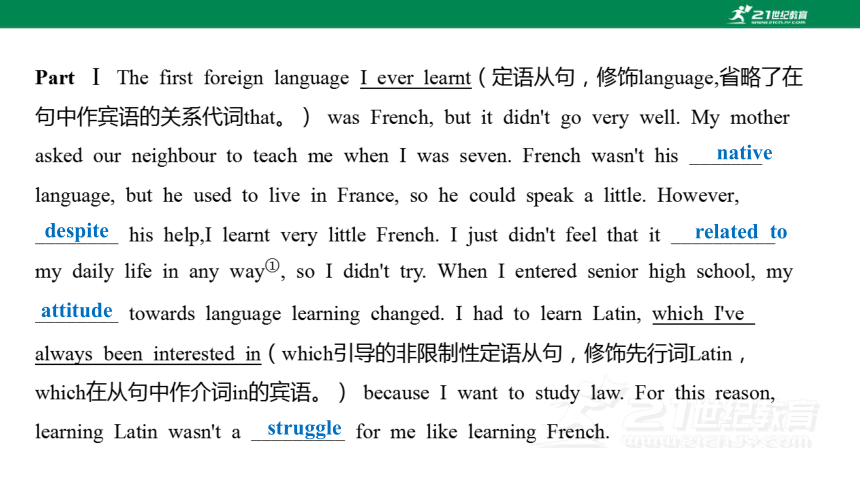
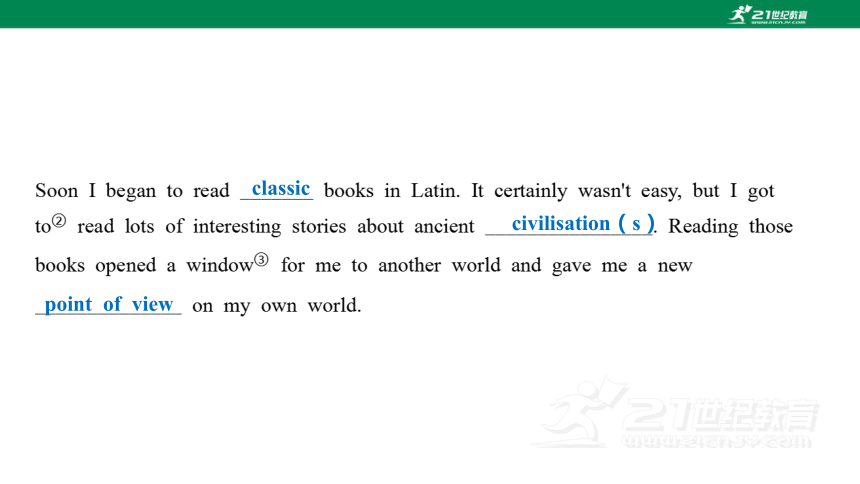
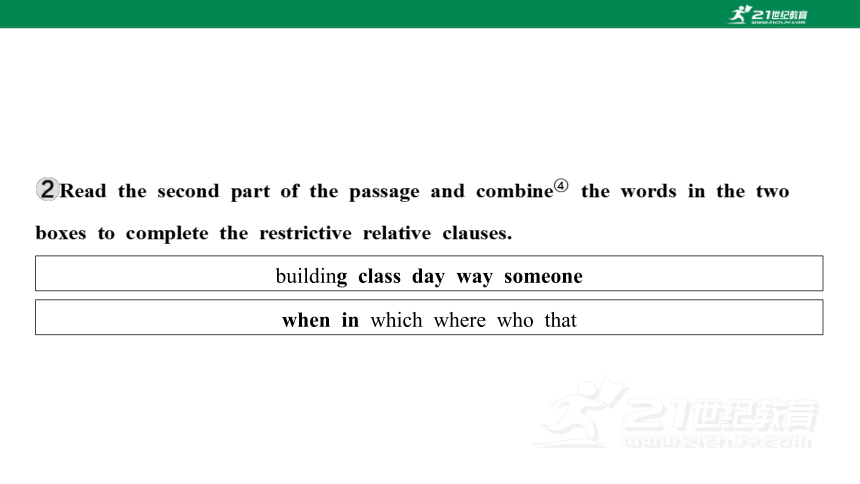
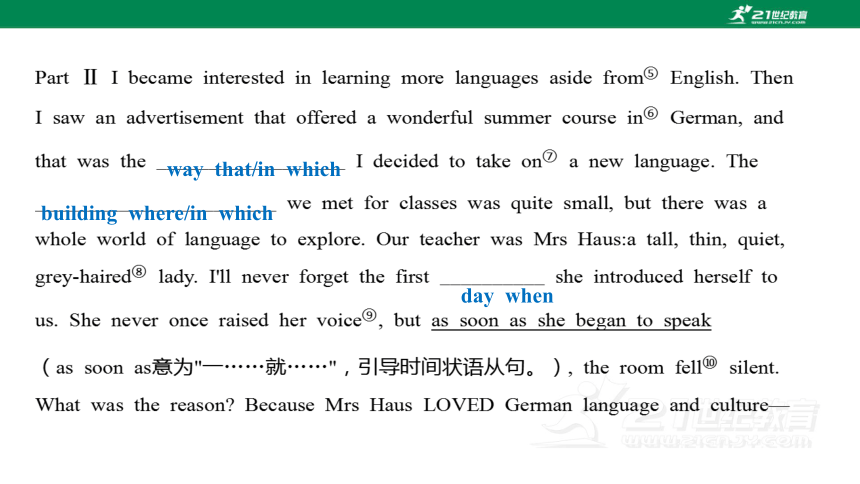

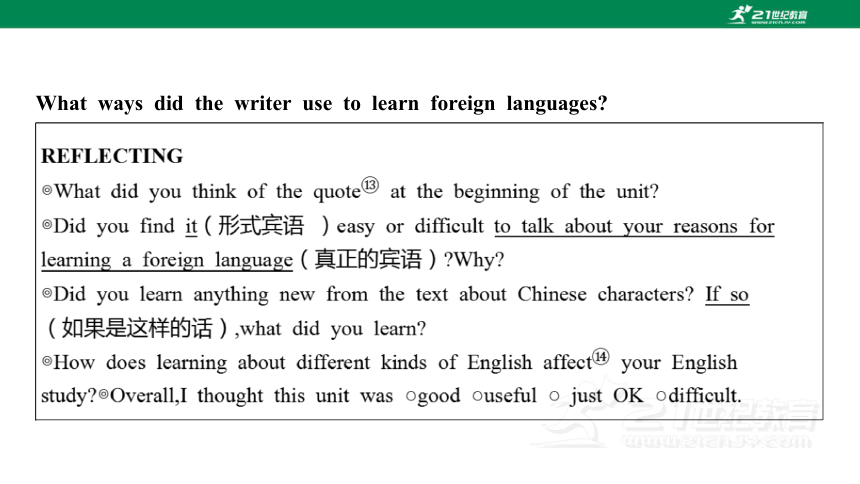

文档简介
(共27张PPT)
UNIT 5 LANGUAGES AROUND
THE WORLD
Section Ⅳ Assessing Your Progress &
Video Time
英语版必修第一册人教版
课文对译解读
Assessing Your Progress
原文呈现
Read the first part of a passage and find suitable words for the blanks.
attitude classic point of view civilisation
despite native related to struggle
Part Ⅰ The first foreign language I ever learnt(定语从句,修饰language,省略了在
句中作宾语的关系代词that。) was French, but it didn't go very well. My mother
asked our neighbour to teach me when I was seven. French wasn't his _______
language, but he used to live in France, so he could speak a little. However,
________ his help,I learnt very little French. I just didn't feel that it __________
my daily life in any way , so I didn't try. When I entered senior high school, my
________ towards language learning changed. I had to learn Latin, which I've
always been interested in(which引导的非限制性定语从句,修饰先行词Latin,
which在从句中作介词in的宾语。) because I want to study law. For this reason,
learning Latin wasn't a _________ for me like learning French.
native
despite
related to
attitude
struggle
Soon I began to read _______ books in Latin. It certainly wasn't easy, but I got
to read lots of interesting stories about ancient ________________. Reading those
books opened a window for me to another world and gave me a new
______________ on my own world.
classic
civilisation(s)
point of view
Read the second part of the passage and combine the words in the two
boxes to complete the restrictive relative clauses.
building class day way someone
when in which where who that
Part Ⅱ I became interested in learning more languages aside from English. Then
I saw an advertisement that offered a wonderful summer course in German, and
that was the __________________ I decided to take on a new language. The
_______________________ we met for classes was quite small, but there was a
whole world of language to explore. Our teacher was Mrs Haus:a tall, thin, quiet,
grey-haired lady. I'll never forget the first __________ she introduced herself to
us. She never once raised her voice , but as soon as she began to speak
(as soon as意为"一……就……",引导时间状语从句。), the room fell silent.
What was the reason Because Mrs Haus LOVED German language and culture—
way that/in which
building where/in which
day when
and everybody who was in her classes couldn't help but love the language, too.
We all loved the _______________ she talked about German food and traditions.
And I realised what makes a good teacher(what引导的宾语从句,what在从句中作
主语。).A good teacher is __________________ is in love with what she or
he is teaching.
class in which
someone who/that
What ways did the writer use to learn foreign languages
REFLECTING
◎What did you think of the quote at the beginning of the unit
◎Did you find it(形式宾语 )easy or difficult to talk about your reasons for
learning a foreign language(真正的宾语) Why
◎Did you learn anything new from the text about Chinese characters If so
(如果是这样的话),what did you learn
◎How does learning about different kinds of English affect your English
study ◎Overall,I thought this unit was ○good ○useful ○ just OK ○difficult.
* Project:Create your own word bank
Study an English-English dictionary to help you create a word bank.
There are many different English-English dictionaries. Here is an entry from a
commonly used dictionary(动词-ed作前置定语修饰dictionary,use与dictionary之间
是逻辑上的动宾关系。).
Choose the words that are most difficult/useful to you and put them into
your word bank.
1 Decide how to organise the words. For example:
· in alphabetical order :A,B,C, etc.
· by group: all the words related to a certain topic, pronunciation, part of speech ,
etc.
· by commonly confused words, such as "chicken/kitchen","diary/dairy", etc.
· by memory devices: words that you have memorised together, such as words
with the same roots , etc.
2 Complete the entries.
· English definitions
· grammar information
· one or two example sentences
3 Illustrate them.
·drawings ·diagrams
·tables ·cartoons
tongue
n. the soft part inside one's mouth that we use for speaking and eating
cab
n. a taxi
calligraphy
n. the art of producing beautiful writing using special pens or brushes(动词-ing短
语作方式状语)
Work in pairs. Exchange ideas with each other about how you made your
word bank. Then discuss how you are going to use it to help your English
study.
名师圈点
①in any way 无论如何
②get to do sth.有机会做某事;开始做某事
③window n. 熟词生义 [sing.] 了解信息的渠道,窗口
④combine /k m ba n/ vt. & vi. (使)结合,组合
⑤aside from... = apart from... 除……之外;除了……还有
⑥a course in/on ... 一节……课
course /k :s/ n.[C] 课程
⑦take on 决定做,承担(责任),同意负责
⑧grey-haired adj. 头发灰白的
构词法 grey-haired是"形容词+名词+-ed"构成的复合形容词。类似的词还有:kind-
hearted(好心的)、middle-aged(中年的)、blue-eyed(蓝眼睛的)、cold-blooded
(冷血的)等。
⑨raise one's voice提高某人的嗓门
⑩fall /f :l/ linking verb 意为"进入(某状态)",后面常跟形容词作表语。
fall silent沉默下来
fall asleep 入睡
fall ill 病倒
can't help but do sth.=can't help doing sth.情不自禁做某事
be in love with sth.热爱某事物(表示状态)
区别 fall in love with sth.喜欢上某事物(表示动作)
quote /kw t/ n.[C]引语,引文 vt.& vi. 引用,引述
affect / fekt/ vt. 影响;(疾病)侵袭;深深打动
entry / entri/ n.[C](词典等的)条目;入口
in alphabetical order 按照字母顺序
in...order 按照……顺序
part of speech 词性
memorise/ mem ra z/ vt. 记住,记忆
root /ru:t/n.[C] 词根
definition/ def n n/ n.[C,U] 释义,解释;[C]定义
illustrate / l stre t/ vt. (用示例、图画等)说明,解释
diagram/ da gr m/ n.[C] 图表,示意图
Video Time
原文呈现
Chinese Characters
The Chinese writing system has evolved from ancient times. Learning Chinese
characters can connect us with people from long ago. Written Chinese has also
been adapted so it can be used by future generations .
BEFORE YOU WATCH
Complete the sentences with the words below.
carved classics era origins radicals
1.Ancient Chinese people _______ symbols onto turtle shells or bones of animals.
2.Many of today's characters have their ________ in the observations of ancient
Chinese people.
carved
origins
3.About 80 percent of Chinese characters("分数/百分数+ of + 名词"作主语时,谓
语动词的单复数由of后面的名词的单复数决定。) are made up of smaller parts,
called ________.
radicals
4.If you can read Chinese characters, you can read Chinese ________ from
thousands of years ago.
5.Chinese characters have been adapted into digital form in the modern ____.
classics
era
WHILE YOU WATCH
Choose the correct answers.
1.How many tales or legends about the origin of Chinese characters are mentioned
in the video ( )
B
A.Three. B.Four. C.Five.
2.Today, written Chinese is the ___ system of writing in the world.
B
A.most complicated
B.oldest continuously used
C.hardest
3.The character jia probably originated from the idea that ___.
B
A.animals should live in family homes
B.a good family home has plenty of food
C.ancient homes always kept pigs
4.China's unified writing system forms a strong bridge linking ___.
C
A.China with the rest of the world
B.Asia, Africa, and Europe
C.the present and the past
5.Written Chinese spreads ___ wherever it goes.
A
A.Chinese culture B.Chinese classics C.tales and legends
名师圈点
①adapt / d pt/ vt. 使适应,使适合(新用途、新情况);改编,改写;
vt.& vi.适应(新情况)
②generation / d en re n/ n.[C] 一代人
③era / r / n.[C] 时代,年代
④origin / r d n/ n.[C] 起源,源头;出身
拓展
⑤ observation / bz ve n/ n.[U,C] 观察,观测,监视
observe(vt.)+-ation(名词后缀)→observation(n.)
⑥be made up of... 由……组成
⑦thousands of数以千计的,成千上万的
⑧digital / d d tl/ adj. 数字的,数码的
⑨ complicated / k mpl ke t d/adj. 复杂的
⑩continuously adv. 连续不断地
plenty of 大量的,充足的(其后跟可数名词复数或不可数名词)
谢谢
21世纪教育网(www.21cnjy.com)
中小学教育资源网站
兼职招聘:
https://www.21cnjy.com/recruitment/home/admin
UNIT 5 LANGUAGES AROUND
THE WORLD
Section Ⅳ Assessing Your Progress &
Video Time
英语版必修第一册人教版
课文对译解读
Assessing Your Progress
原文呈现
Read the first part of a passage and find suitable words for the blanks.
attitude classic point of view civilisation
despite native related to struggle
Part Ⅰ The first foreign language I ever learnt(定语从句,修饰language,省略了在
句中作宾语的关系代词that。) was French, but it didn't go very well. My mother
asked our neighbour to teach me when I was seven. French wasn't his _______
language, but he used to live in France, so he could speak a little. However,
________ his help,I learnt very little French. I just didn't feel that it __________
my daily life in any way , so I didn't try. When I entered senior high school, my
________ towards language learning changed. I had to learn Latin, which I've
always been interested in(which引导的非限制性定语从句,修饰先行词Latin,
which在从句中作介词in的宾语。) because I want to study law. For this reason,
learning Latin wasn't a _________ for me like learning French.
native
despite
related to
attitude
struggle
Soon I began to read _______ books in Latin. It certainly wasn't easy, but I got
to read lots of interesting stories about ancient ________________. Reading those
books opened a window for me to another world and gave me a new
______________ on my own world.
classic
civilisation(s)
point of view
Read the second part of the passage and combine the words in the two
boxes to complete the restrictive relative clauses.
building class day way someone
when in which where who that
Part Ⅱ I became interested in learning more languages aside from English. Then
I saw an advertisement that offered a wonderful summer course in German, and
that was the __________________ I decided to take on a new language. The
_______________________ we met for classes was quite small, but there was a
whole world of language to explore. Our teacher was Mrs Haus:a tall, thin, quiet,
grey-haired lady. I'll never forget the first __________ she introduced herself to
us. She never once raised her voice , but as soon as she began to speak
(as soon as意为"一……就……",引导时间状语从句。), the room fell silent.
What was the reason Because Mrs Haus LOVED German language and culture—
way that/in which
building where/in which
day when
and everybody who was in her classes couldn't help but love the language, too.
We all loved the _______________ she talked about German food and traditions.
And I realised what makes a good teacher(what引导的宾语从句,what在从句中作
主语。).A good teacher is __________________ is in love with what she or
he is teaching.
class in which
someone who/that
What ways did the writer use to learn foreign languages
REFLECTING
◎What did you think of the quote at the beginning of the unit
◎Did you find it(形式宾语 )easy or difficult to talk about your reasons for
learning a foreign language(真正的宾语) Why
◎Did you learn anything new from the text about Chinese characters If so
(如果是这样的话),what did you learn
◎How does learning about different kinds of English affect your English
study ◎Overall,I thought this unit was ○good ○useful ○ just OK ○difficult.
* Project:Create your own word bank
Study an English-English dictionary to help you create a word bank.
There are many different English-English dictionaries. Here is an entry from a
commonly used dictionary(动词-ed作前置定语修饰dictionary,use与dictionary之间
是逻辑上的动宾关系。).
Choose the words that are most difficult/useful to you and put them into
your word bank.
1 Decide how to organise the words. For example:
· in alphabetical order :A,B,C, etc.
· by group: all the words related to a certain topic, pronunciation, part of speech ,
etc.
· by commonly confused words, such as "chicken/kitchen","diary/dairy", etc.
· by memory devices: words that you have memorised together, such as words
with the same roots , etc.
2 Complete the entries.
· English definitions
· grammar information
· one or two example sentences
3 Illustrate them.
·drawings ·diagrams
·tables ·cartoons
tongue
n. the soft part inside one's mouth that we use for speaking and eating
cab
n. a taxi
calligraphy
n. the art of producing beautiful writing using special pens or brushes(动词-ing短
语作方式状语)
Work in pairs. Exchange ideas with each other about how you made your
word bank. Then discuss how you are going to use it to help your English
study.
名师圈点
①in any way 无论如何
②get to do sth.有机会做某事;开始做某事
③window n. 熟词生义 [sing.] 了解信息的渠道,窗口
④combine /k m ba n/ vt. & vi. (使)结合,组合
⑤aside from... = apart from... 除……之外;除了……还有
⑥a course in/on ... 一节……课
course /k :s/ n.[C] 课程
⑦take on 决定做,承担(责任),同意负责
⑧grey-haired adj. 头发灰白的
构词法 grey-haired是"形容词+名词+-ed"构成的复合形容词。类似的词还有:kind-
hearted(好心的)、middle-aged(中年的)、blue-eyed(蓝眼睛的)、cold-blooded
(冷血的)等。
⑨raise one's voice提高某人的嗓门
⑩fall /f :l/ linking verb 意为"进入(某状态)",后面常跟形容词作表语。
fall silent沉默下来
fall asleep 入睡
fall ill 病倒
can't help but do sth.=can't help doing sth.情不自禁做某事
be in love with sth.热爱某事物(表示状态)
区别 fall in love with sth.喜欢上某事物(表示动作)
quote /kw t/ n.[C]引语,引文 vt.& vi. 引用,引述
affect / fekt/ vt. 影响;(疾病)侵袭;深深打动
entry / entri/ n.[C](词典等的)条目;入口
in alphabetical order 按照字母顺序
in...order 按照……顺序
part of speech 词性
memorise/ mem ra z/ vt. 记住,记忆
root /ru:t/n.[C] 词根
definition/ def n n/ n.[C,U] 释义,解释;[C]定义
illustrate / l stre t/ vt. (用示例、图画等)说明,解释
diagram/ da gr m/ n.[C] 图表,示意图
Video Time
原文呈现
Chinese Characters
The Chinese writing system has evolved from ancient times. Learning Chinese
characters can connect us with people from long ago. Written Chinese has also
been adapted so it can be used by future generations .
BEFORE YOU WATCH
Complete the sentences with the words below.
carved classics era origins radicals
1.Ancient Chinese people _______ symbols onto turtle shells or bones of animals.
2.Many of today's characters have their ________ in the observations of ancient
Chinese people.
carved
origins
3.About 80 percent of Chinese characters("分数/百分数+ of + 名词"作主语时,谓
语动词的单复数由of后面的名词的单复数决定。) are made up of smaller parts,
called ________.
radicals
4.If you can read Chinese characters, you can read Chinese ________ from
thousands of years ago.
5.Chinese characters have been adapted into digital form in the modern ____.
classics
era
WHILE YOU WATCH
Choose the correct answers.
1.How many tales or legends about the origin of Chinese characters are mentioned
in the video ( )
B
A.Three. B.Four. C.Five.
2.Today, written Chinese is the ___ system of writing in the world.
B
A.most complicated
B.oldest continuously used
C.hardest
3.The character jia probably originated from the idea that ___.
B
A.animals should live in family homes
B.a good family home has plenty of food
C.ancient homes always kept pigs
4.China's unified writing system forms a strong bridge linking ___.
C
A.China with the rest of the world
B.Asia, Africa, and Europe
C.the present and the past
5.Written Chinese spreads ___ wherever it goes.
A
A.Chinese culture B.Chinese classics C.tales and legends
名师圈点
①adapt / d pt/ vt. 使适应,使适合(新用途、新情况);改编,改写;
vt.& vi.适应(新情况)
②generation / d en re n/ n.[C] 一代人
③era / r / n.[C] 时代,年代
④origin / r d n/ n.[C] 起源,源头;出身
拓展
⑤ observation / bz ve n/ n.[U,C] 观察,观测,监视
observe(vt.)+-ation(名词后缀)→observation(n.)
⑥be made up of... 由……组成
⑦thousands of数以千计的,成千上万的
⑧digital / d d tl/ adj. 数字的,数码的
⑨ complicated / k mpl ke t d/adj. 复杂的
⑩continuously adv. 连续不断地
plenty of 大量的,充足的(其后跟可数名词复数或不可数名词)
谢谢
21世纪教育网(www.21cnjy.com)
中小学教育资源网站
兼职招聘:
https://www.21cnjy.com/recruitment/home/admin
